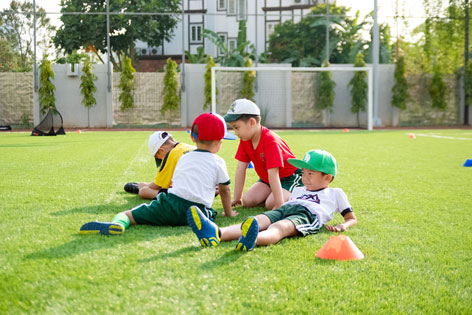You are now reading:
International schools: what are the actual benefits for your kids?

Receive Urbox e-voucher up to VND 45 million when purchase policy with IP from VND 15 million.
Find out moreyou are in Personal Banking


You are now reading:
International schools: what are the actual benefits for your kids?
Nowadays many middle-class Vietnamese families in Vietnam are choosing to send their kids to international schools in spite of the high costs.
Is this a child care trend or actually a worthwhile investment?
Our experts look at what your kid will gain from an international school education.
There's no denying schools are a huge part of children’s lives. They spend a huge amount of time at their school, not only studying, absorbing new concepts and accumulating knowledge, but also developing and discovering their personalities through socialisation and exploring their interests. Many Vietnamese parents are now choosing international schools as they believe the educational programs, combined with the all-round environment and extracurricular activities, give their kids a firm foundation for their future in a globalised world. There are many obvious perks. For starters, kids attending an international school will quickly become fluent in English (and possibly other languages). Vietnamese parents also believe that an international school will prepare their kids to access overseas universities in future. Is that really the case?

Ms. Tuong Lan, Strategy & Performance Management, Group Channels & Digitalisation at UOB Vietnam, is having her son studying at an international school in Go Vap District. She shares:
“Yes, my 6-year old son is studying four subjects entirely in English (maths, English, science as well as IT/ media) at his school,” says Ms. Tuong Lan, whose son attends an international school in Go Vap District in Ho Chi Minh City. “The curriculum follows a program used in other international education systems and is designed to focus on building up the pupils’ English, mathematical and problem-solving ability and many other skills.”
Furthermore, Ms Tuong Lan agrees that certificates from international schools are well recognised and of great value should her child ever transfer to a secondary school in an English-speaking country or wish to study at an overseas university in future. She also praised the wide range of after-school activities that her kid can participate in so he can explore his own interests.
Our UOB experts also believe there many more advantages to sending your kids to an international school. For example:
Below are some comments from students studying at international schools and their parents:

“My husband and I both studied in a national school. After we graduated We then studied abroad. So we know all the drawbacks a person can face, if they go to study in university overseas but previously never learned in an international environment and cannot communicate fluently in English,” says Ms. Thao Nguyen, Creative Director of Gold Magazine from Ho Chi Minh City. “The school where my kid is studying not only uses English but also has plenty of extracurricular activities, so after class, she does not need extra time for study. As school time finishes quite early, she can have more time with her family and get plenty of sleep which is good for her long-term health.”

“I like going to school because it’s very fun and interesting!” says Ms. Tuong Lan’s 6-year old child.
“I’m happy to have teachers and friends play with me. My three favourite extracurricular classes are coding, karate and Kpop. While my friends who live next door to me have to go to extra classes after school, I get home at 4. I can relax, take shower, eat dinner and do my homework. At 9pm, I go to sleep so that I can wake up early to go to school tomorrow,” says Ms. Thao Nguyen’s 7-year old child.
How to choose the right school? The process of choosing a suitable international for your children does not have to be complicated but we would advise taking the following factors into consideration:
There are definitely many advantages to enrolling your kids at an international school. We might add that it can be difficult for a student to readjust to a national school should you decide to take them out of the international school. By attending an international school, they will have got used to a very different academic approach, school environment and lifestyle.
Parents should carefully prepare a budget or consult with a prestigious bank such as UOB to make a detailed financial plan so your kids can flourish at an international school and fulfil their future goals.
If you intend to register your kid at an international school and need more advice or assistance with financial planning, do not hesitate to leave a comment and our UOB experts will reply to you at the earliest opportunity.
Tran Ngoc Phuong, Director
The fee is average of 400 million a year for primary school and 500 - 600 million for high school. Does UOB have any financial solution for investing on education? I would like to plan for my child in first grade.

19 Dec 2024 • 2 mins
